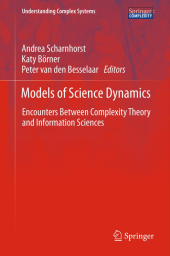 Neuerscheinungen 2014Stand: 2020-02-01 |
Schnellsuche
ISBN/Stichwort/Autor
|
Herderstraße 10
10625 Berlin
Tel.: 030 315 714 16
Fax 030 315 714 14
info@buchspektrum.de |

Peter van den Besselaar, Katy Börner, Andrea Scharnhorst
(Beteiligte)
Models of Science Dynamics
Encounters Between Complexity Theory and Information Sciences
Herausgegeben von Scharnhorst, Andrea; Börner, Katy; Besselaar, Peter van den
2012. 2014. xxx, 270 S. 82 SW-Abb.,. 235 mm
Verlag/Jahr: SPRINGER, BERLIN 2014
ISBN: 3-642-44884-4 (3642448844)
Neue ISBN: 978-3-642-44884-3 (9783642448843)
Preis und Lieferzeit: Bitte klicken
This volume explores the structure and evolution of science, an emerging field where scholars, science and science communication themselves become the basic objects of research. It aims to provide, for the first time, a unified mathematical model of science.
Models of Science Dynamics aims to capture the structure and evolution of science, the emerging arena in which scholars, science and the communication of science become themselves the basic objects of research. In order to capture the essence of phenomena as diverse as the structure of co-authorship networks or the evolution of citation diffusion patterns, such models can be represented by conceptual models based on historical and ethnographic observations, mathematical descriptions of measurable phenomena, or computational algorithms. Despite its evident importance, the mathematical modeling of science still lacks a unifying framework and a comprehensive study of the topic. This volume fills this gap, reviewing and describing major threads in the mathematical modeling of science dynamics for a wider academic and professional audience. The model classes presented cover stochastic and statistical models, system-dynamics approaches, agent-based simulations, population-dynamics models, and complex-network models. The book comprises an introduction and a foundational chapter that defines and operationalizes terminology used in the study of science, as well as a review chapter that discusses the history of mathematical approaches to modeling science from an algorithmic-historiography perspective. It concludes with a survey of remaining challenges for future science models and their relevance for science and science policy.
Part I Foundations.- An Introduction to Modeling Science: Basic Model Types, Key Definitions, and a General Framework for the Comparison of Process Models.- Mathematical Approaches to Modeling Science From an Algorithmic-historiography Perspectice.- Part II Exemplary Model Type.- Knowledge Epidemics and Population Dynamics Models for Describing Idea Diffusion.- Agent-based Models of Science.- Evolutionary Game Theory and Complex Networks of Scientific Information.- Part III Exemplary Model Applications.- Dynamic Scientific Co-authorship Networks.- Citation Networks.- Part IV Outlook.- Science Policy and the Challenges for Modeling Science.- Index.
From the reviews:
"The book is a comprehensive review of the mathematical models of science from its origins. ... each chapter has ´checkpoints´, i.e., a box or a table presenting either a list of relevant questions together with short answers or a summary of the key-points discussed. This particular structure makes the book especially suited for graduate students and scholars ... . experts will surely appreciate the richness and depth of the cited literature, for the first time so well organized into a single book." (Stefano Balietti, Journal of Artificial Societies and Social Simulation, Vol. 15 (3), 2012)


